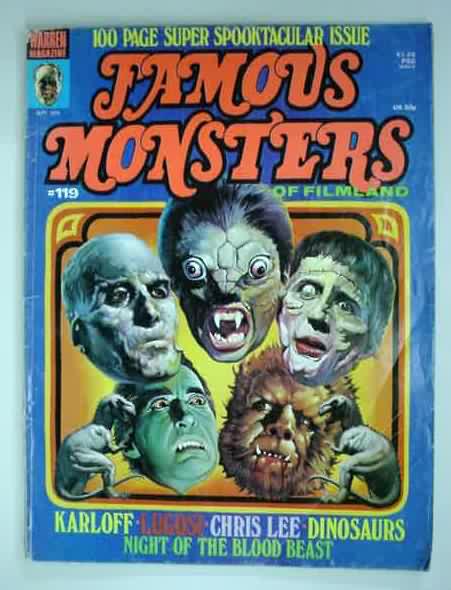 |
| Someone mucked with the logo again for FAMOUS MONSTERS #119. This abomination may even be worse than the one that appeared on the cover of issue #100. I don't know why someone (Jim Warren? Forry?) felt the need to change one of the most distinctive magazine logos ever but they did so at least twice during the magazine's first run. The cover images on this issue are from a variety of Hammer horror films and the fact that it's billed as a "100 Page Super Spooktacular Issue" clues me in that's it's an all reprint annual issue (what Forry used to lovingly refer to as a "Fearbook" rather than a "Yearbook"). Features include the usual suspects: Boris Karloff, Bela Lugosi, Christopher Lee, Dinosaurs and NIGHT OF THE BLOOD BEAST (!?). |
Tuesday, December 31, 2013
MY FAMOUS MONSTERS 57
Saturday, December 28, 2013
WASTELAND
 |
| Full disclosure time. WASTELAND BOOK ONE: CITIES IN DUST is a book I would have never purchased for myself. If I saw a copy of this trade paperback sitting on the shelf of a bookstore or comic book shop, I would never even pick it up and thumb through it. Why? I dunno, other than it just doesn't grab me at first glance. But since I recently acquired copies of the first two trade paperback collections of this series in a comic book trade with a fellow collector, I figured the least I could do was give it a chance and read it before I put it up for sale on eBay. And that's just what I did today. The Oni Press series is written by Antony Johnston and illustrated by Christopher Mitten , two gentlemen who's work I am not familiar with. The first book, CITIES IN DUST, collects the first six issues of this ongoing series, which has seen more than fifty monthly issues published thus far as well as eight trade paperback collections. WASTELAND is a post-apocalyptic epic adventure set one hundred years after a disaster known only as "The Big Wet" has occurred in the United States. The country has been reduced to a barren wasteland (hence, the title) and what few survivors there are lead a hardscrabble existence. A stranger comes into the small town of Providence one day and before long all hell has broken loose. The handful of citizens that survive are led by the stranger to Newbegin, the nearest outpost of civilization. But the desert city is under the rule of a mad priest who fancies himself a god. There are clues and hints dropped along the way as to the secret behind the disaster and what's really going on but Johnston and Mitten play their cards close to the vest. I'm sure parts of the puzzle have since been revealed but after reading only this first volume, I'm still pretty much in the dark. WASTELAND plays like a million other westerns/post-apocalyptic yarns. It's neither better than average or worse. It hits all of the narrative tropes and has enough action and intrigue to keep readers interested and turning the pages. The black and white art by Mitten is serviceable although at times his figures look too loose and sketchy and many of his male characters are hard to tell apart due to their hair, face and body similarities. I'll give the second volume a read since I have a copy but I don't think I'll be actively seeking out any additional volumes in this series. It's not bad, it's just not that great either. |
MASSACRE MAFIA STYLE
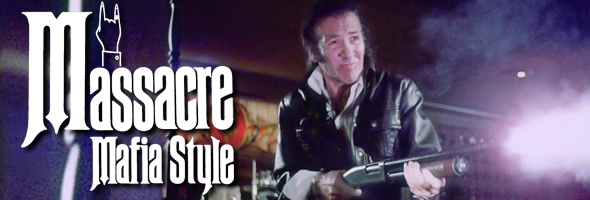 |
| You know you're watching a blatant ripoff of THE GODFATHER (1972) when the film stoops so low as to steal the type font from that Academy Award winning classic. I watched MASSACRE MAFIA STYLE (1975) the other day (recorded off of TCM) and it was not a pleasant experience. Mario Puzo's bestselling novel THE GODFATHER and Francis Ford Coppola's film version of the book spawned a host of imitators as authors, publishers, filmmakers and movie studios all wanted to cash in on the red hot organized crime mania of the 1970s. Countless books and films were produced and released during this period and it's safe to say that none of them ever met with the degree of success, both commercially and artistically, as did the Puzo and Coppola originals. Still, that didn't stop people from trying. People like Duke Mitchell who produced, directed, wrote, composed the music for and starred in MASSACRE MAFIA STYLE. Rumor is that Mitchell also catered the film, cleaned the toilets and changed the light bulbs on the sets. The film was originally released as LIKE FATHER, LIKE SON. It didn't do much business under that title and was re-released in 1978 as THE EXECUTIONER. By that time, the mafia movie craze was long over. The film appears to have been re-titled MASSACRE MAFIA STYLE for another go round under the auspices of Grindhouse Releasing. Would be auteur Mitchell's talent is not commensurate to his ambition however in this confused and confusing saga of Mimi (Mitchell) a son of Mafia don who climbs his way to the top of the Los Angeles crime organization by killing everyone who gets in his way. As Mimi says (more than once in the film): "You're either in or in the way." The film opens with Mimi and his partner Jolly (Vic Caesar) brutally killing many of their enemies in an office building massacre. Who knew that so many crooked lawyers, pimps, bookies, front men, muscle for hire and assorted stooges all had their headquarters in the same building? How convenient. Mitchell strains mightily to give this dreck some semblance of gravitas. He desperately wants it to be as serious and important a film as THE GODFATHER and he does so by hitting many of the same themes: tradition, honor, loyalty, family, betrayal and brutal extermination of enemies. But the low budget, incoherent script and lack of talent in front of and behind the camera all conspire to keep this mess strictly drive-in and urban grindhouse fare. |
MY FAMOUS MONSTERS 55
 |
| Great painting of the immortal Vincent Price as he appeared in MADHOUSE graces the cover of FAMOUS MONSTERS #109. Other features in this issue include SON OF KONG and television's Monster Hall of Fame. |
Friday, December 27, 2013
MY FAMOUS MONSTERS 54
 |
| A terrific Basil Gogos painting of the Hideous Sun Demon graces the cover of FAMOUS MONSTERS #106. Features in this issue include THE GOLDEN VOYAGE OF SINBAD, TALES THAT WITNESS MADNESS and TV's DRACULA starring Jack Palance (one of my all-time favorite actors in an outstanding performance). I've got an original lobby card from HIDEOUS SUN DEMON framed and hanging on the wall of the man cave. A double bill of HIDEOUS SUN DEMON and INCREDIBLE PETRIFIED WORLD, both starring Robert Clarke, was the opening night feature of the Drive-In Double Feature film festival that I was a part of back in the summer of 1994. Remind me to tell you the full story of that illustrious endeavor one of these days. It involves the aforementioned Robert Clarke and the one and only Forrest J. Ackerman. Stay tuned! |
Thursday, December 26, 2013
DRUG OF CHOICE
 |
| Hard Case Crime (my favorite book publisher) recently reissued (in handsome trade paperback editions) the first eight novels that the late Michael Crichton wrote while he was still in Harvard Medical School. Written under the pen name "John Lange", the novels are DRUG OF CHOICE, EASY GO, ODDS ON, SCRATCH ONE, ZERO COOL, THE VENOM BUSINESS, GRAVE DESCEND and BINARY. ODDS ON. Of these eight, two (ZERO COOL and GRAVE DESCEND) were previously published in mass market format by Hard Case. I've read both of those along with BINARY (I had a copy of the original Bantam paperback edition on my shelf for years without knowing that "John Lange" was really Michael Crichton). I finished reading DRUG OF CHOICE on Christmas morning. I can't be too critical of this book because while Crichton was paid for his work, he was not at the time a full-time author. Bestseller status and major motion pictures were still a ways off in his future at the time he wrote this book (and the others) but even at this early stage of his writing career you can see that Crichton knew how to keep readers turning pages by offering a suspenseful plot based on current (or not too-far-distant) technology. DRUG OF CHOICE starts out as a medical mystery when Dr. Roger Clark is presented with two different emergency room patients. One is a Hell's Angel biker, the other, a beautiful movie star. Both patients are in apparently drug induced comas and both eventually awaken with no ill after effects. Except for one thing: the urine of both patients is blue. Clark soon becomes involved with the beautiful movie star as he tries to unravel the mystery of the blue urine. His investigation leads him to a scientific consortium known as Advance Industries, which appears to be involved with research and development of several different cutting-edge technologies. Among them, a Caribbean resort that appears to be a perfect paradise. Before you know it, Clark and movie star Linda are on their way to the island where, of course, everything is not as it seems. This appears to be the first time that Crichton used the trope of a technologically advanced resort in which the technology goes awry with disastrous results, a theme he would later develop in the film WESTWORLD (1973) and his mega-bestseller JURASSIC PARK (1990). But the island paradise storyline soon runs its' course only to be replaced by a plot element in which Clark (now coerced into working for Advance) helps in the creation of a female pop star and her backing band. Again, this is a story element that Crichton expanded upon in his film LOOKER (1981). But the birth of "Glow Girl" is still not the end of this tale which ultimately finds Clark framed and on the run from his former friends and allies before he finally turns the tables on the evil mad scientists by blowing up the Advance Industries corporate headquarters DRUG OF CHOICE is a fast paced, quick read although the ending does seem a little rushed. Crichton is already sounding the warning drum against the unintended consequences of modern science and technology and as I noted previously, he does keep you turning the pages. However his characters are cliched, the dialogue occasionally stilted and just when you think you know what the book is going to be about, Crichton throws in another idea that's never really fully developed. Still, DRUG OF CHOICE is worth reading if only to see how Crichton got his start. |
Wednesday, December 25, 2013
Monday, December 23, 2013
"A LITTLE LAUGHTER, A LITTLE TEAR..."
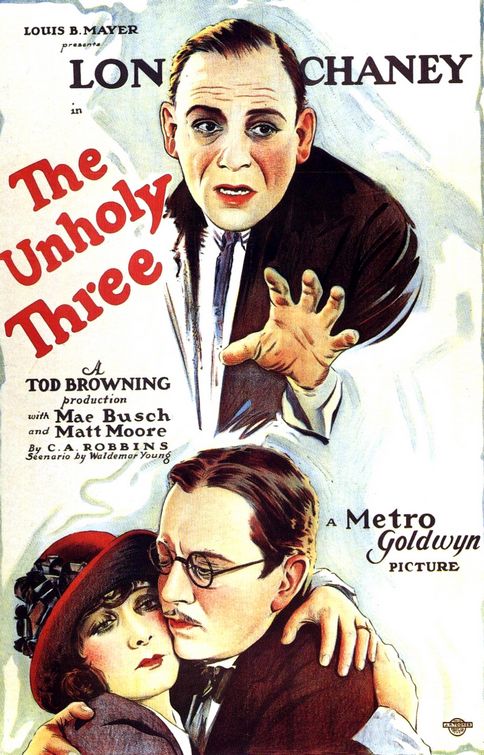 |
I first learned about the silent film THE UNHOLY THREE (1925) in the pages of, what else, FAMOUS MONSTERS. I don't recall which issue (or issues, to be precise) but when I was a kid and a regular reader of FM Forry ran many stories devoted to the incredible Lon Chaney and his films. THE UNHOLY THREE was often mentioned, along with the occasional still from the film. I so desperately wanted to see this film (and many others that I read about) but the odds of having access to a silent film anywhere in the 1960s were pretty slim. Nevertheless, I had an itch that went unscratched until a couple of nights ago when, thanks to TCM, I finally got to see it. Despite being ballyhooed in the pages of FAMOUS MONSTERS and the one-two punch of genre director Tod Browning and star Chaney, UNHOLY isn't a horror film. It's weird, bizarre and creepy in parts but the film is more of a crime thriller mixed with a love story. Chaney plays Echo, a carnival ventriloquist who teams up with strongman Hercules (Victor McLaglen) and pure evil little person Tweedledee ( Harry Earles) to form the title trio. They're aided by the lovely Mae Busch who plays the sweet pickpocket Rosie O'Grady. The three set up a pet shop as a front for their criminal activities and hire unknowing sap Hector McDonald (Matt Moore) to run the store. The scheme concocted by Chaney is brilliant. He poses as a kindly old woman who can communicate with the birds the shop sells (he's really throwing his voice, a neat trick in a silent film). Rich customers buy the birds who of course, do not talk once they're in their new homes. Mrs. O'Grady (Chaney) is then called to the homes of their customers to make the birds talk and, to use the vernacular "case the joint". The trio return later to rob the homes. But things take a deadly turn when Hercules and Tweedledee pull a job without Echo and end up murdering the wealthy owner of a fabulous ruby necklace. Chaney is outraged at the blood on their hands and when a police detective comes calling, they decide to foist Hector off as the fall guy by secreting the gems in his apartment. To complicate matters further, Hector and Rosie have fallen in love while Echo is burning an unrequited torch for the young lady. Hector is arrested, the trio flees, taking Rosie and a hitherto unseen very large ape (!) along to their country hideout. Rosie tells Echo that if he'll do something to exonerate Hector she'll stay with him forever. Echo goes to the courtroom and uses his ventriloquism to help Hector. Hector is acquitted and Rosie keeps her promise to stay with Echo. In a final scene, Echo tells Rosie she's free to go with Hector. As she leaves, Echo uses his dummy to say "goodbye pal" to her. She stops, turns around and looks at him and Chaney's performance in this short scene is nothing short of miraculous. He uses his eyes, his face and his whole body to convey the emotions that he's feeling and the result is one of the most heartbreaking moments I've ever seen in films (silent or sound). It brought a genuine lump to my throat and a tear to my eye. And here I thought I was going to see a horror film! THE UNHOLY THREE was a huge hit for MGM and it was remade in 1930 by Browning and Chaney in what was Chaney's only "talking" picture before his untimely death due to throat cancer. Anyone who thinks silent films are too old and outdated to be worth watching needs to see this film. It is pure cinema using images, story and most importantly, actors using all of their skills to create three-dimensional characters that you genuinely care about. The result is a compelling, engaging film that earns my highest recommendation. It took me more almost fifty years to see THE UNHOLY THREE. It was definitely worth the wait. |
Thursday, December 19, 2013
"AND THE LEONARD PINTH GARNELL AWARD FOR MOST PRETENTIOUS CODSWALLOP OF THE YEAR GOES TO..."
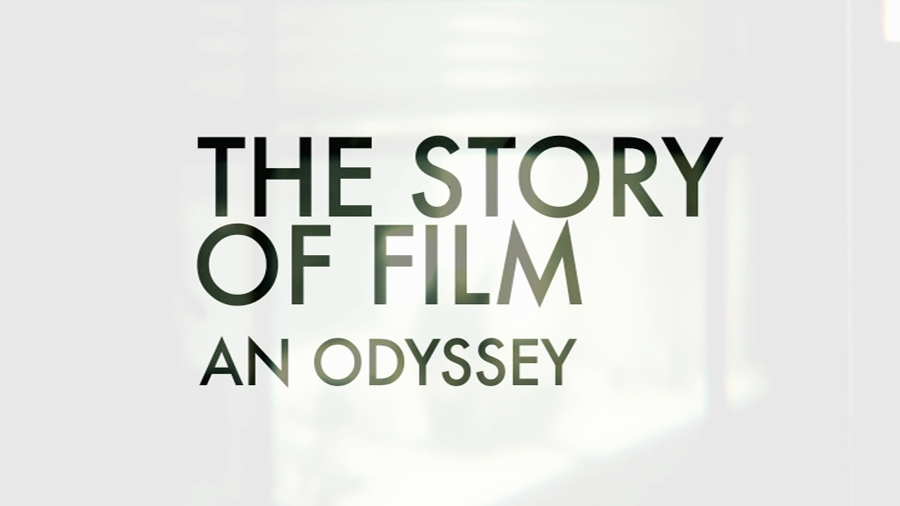 |
| I recently watched the final episode of THE STORY OF FILM on TCM. This ambitious 15 part documentary does just what it's title says, it tells the story of film from the very beginning right up to present day. I saw most of the episodes and while I must admire the amount of work, research, interviews and film making that went into making this behemoth of a series, I must confess to having a few quibbles with the production. Let's get one thing clear right from the start. This series is not just about Hollywood history and American film.While key American movies are included in the series, the primary focus is on world cinema and thus features films from almost every country on the globe. While that's certainly admirable, many of the films that were featured are extremely obscure "artsy-fartsy" films that have most likely never had an American theatrical release outside of New York and Los Angeles. Oh sure, they've probably received screenings at various international film festivals and I suspect many of these films have been written about in the pages of Film Comment magazine (and other publications). But the question is, how many people outside of the respective countries of origin have actually seen these films? And of those members of an admittedly narrow and specialized audience, how many really and truly liked them? I must confess that I saw very little in the clips presented in the series that made me want to see any of these films (provided they're even available from any source). Filmmaker Mark Cousins and TCM host Robert Osborne co-introduced each episode and the contrast between the two was striking. Robert Osborne was always impeccably attired and well-groomed. He came across, as he always does, as a consummate professional. He's genial and knowledgeable and he does his job extremely well. Cousins, on the other hand, looked like he just got out of bed ten minutes before the cameras started rolling. The man doesn't appear to own any pairs of socks or a comb of any kind. His droning, monotone voice over becomes wearying after awhile and the way he pronounces "innovative" (as he does in every episode) always cracked me up. The final episode, which covered post 9/11 cinema, focused once again primarily on foreign films. Only three non-documentary U.S. produced films were included in this final roundup. The films were James Cameron's AVATAR (which I didn't care for), THE ASSASSINATION OF JESSE JAMES BY THE COWARD ROBERT FORD (one of the ten worst films I've seen in the last ten years) and MULHOLLAND DRIVE ( I will not see a single frame of film shot by David Lynch). And it's not just that Cousins finds these films notable out of all of the American films produced in the last ten years. It's that he finds some hideously obscure film from Thailand (I'm not making this up) far more "innovative" and better. Are you kidding me? I think Cousins has justly won the award that we're presenting to him this evening. Too bad there's no financial component attached to this prestigious award. Cousins could use the money to not only buy a pair of socks and a comb but an entire wardrobe because, let's face, this emperor's nekkid. |
Tuesday, December 17, 2013
THE STEEL TSAR OR, IF YOU'VE SEEN JUAN, YOU'VE SEEN AMAHL
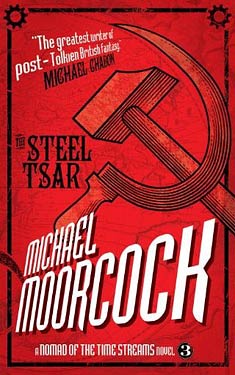 |
| There's a bad old joke about a mother who has identical twin sons named Juan and Amahl. She only has a photo of Juan. When asked why she doesn't have a photo of her other son, she replies, "if you've seen Juan, you've seen Amahl." That's the way I felt after I finished reading THE STEEL TSAR by Michael Moorcock the other day. This third and final novel in the Nomad of the Time Streams trilogy is remarkably similar to the other two entries in the series, THE WARLORD OF THE AIR and THE LAND LEVIATHAN. In TSAR, our time-tossed hero Oswald Bastable once again finds himself in an alternate timeline. The year is 1941 and World War II has just begun. But here the global conflict is waged between the last two remaining imperial powers of this timeline: Russia and Japan. This time, it's an atomic bombing of Hiroshima (similar to the one that occurred at the end of WARLORD OF THE AIR) that precipitates the conflict. Once again, the first part of the book is given over to Bastables' adventures in this brave new world in which he's eventually captured by the Japanese before finding himself in the Russian Imperial Air Corps, where he serves aboard an airship. We're finally introduced to the titular Steel Tsar about midway through the book. He may or may not be this world's Josef Stalin but whoever he really is, he's a cut-rate Dr. Doom like figure as he wears an iron mask that hides his true visage. The Tsar's aim is to incite civil war in Russia leading his cossacks (and a gigantic mechanical man) against the might of the Russian government's aerial forces. Oh, and the Tsar also plans to drop an atomic weapon of his own on a heavily populated Russian city. Bastable is once again aided by the mysterious Una Persson (she appears in all three novels) and it's in the final part of the book that Bastable learns about the League of Temporal Adventurers (which sounds a helluva lot more swashbuckling than Moorcock portrays them). Persson, along with the mysterious albino wizard Von Bek (who also appeared in WARLORD OF THE AIR and appears to be an incarnation of Moorcock's eternal warrior hero Elric) and Cornelius Dempsey (also an iteration of Moorcock's eternal character Jerry Cornelius) recruit Bastable into the League, a fate which he willingly accepts. The book ends with Bastable and his new colleagues somewhere in time. Imperial powers. Airships. A titular anti-hero character who doesn't appear until midway through the book (O.T. Shaw in THE WARLORD OF THE AIR, the Black Attila in LAND LEVIATHAN and the Steel Tsar here). Airships. Discussions about the pros and cons of various political philosophies. A mad attack thwarted at the last minute. Airships. Endings that leave Bastable in yet another timeline. Did I mention airships? All three of these novels contain all of these elements in almost exactly the same measures. I'm glad I didn't read them all back to back or the overwhelming sense of sameness may have been too much to take. Bottom line: I'm glad to have read the series. I've long wanted to sample some of Moorcock's more accessible works and this neat, short (in terms of page count) trilogy was just the right thing to start with. However, I was not blown away by the series and it will probably be awhile before I read anymore Moorcock but if you like science fiction novels about alternate time lines (with lots and lots of airships), you might want to try the A Nomad of the Time Streams trilogy. Start with WARLORD OF THE AIR and if you like it, read the other two books. If not, well, if you've seen Juan.... |
Monday, December 16, 2013
SAGA (NO, NOT THE MEN'S ADVENTURE MAGAZINE)
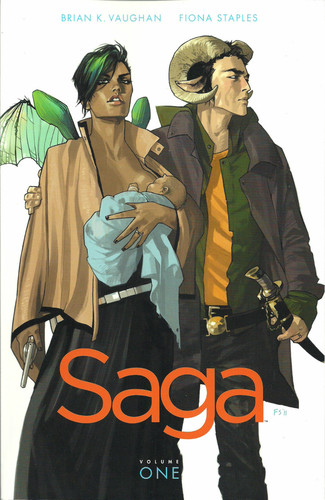 |
| Twenty some odd years ago I took a stand up comedy class. Over the course of six weeks, we were tasked with writing five minutes worth of original material that we would then perform onstage in front of a large audience at a local comedy club. Some of us (like myself) worked hard at this task, while others didn't pay any attention to our teacher's instructions and bombed miserably once they were onstage and in front of a live audience. One of the things that our teacher, Sam Cox (who at the time was a regular writer for Jay Leno) told us about writing and performing comedy was this bon mot which I've never forgotten: "Don't do blue. It's cheap, easy and a lazy way to do comedy." I bring this up because I was reminded of Sam's sage advice while reading the trade paperback of SAGA VOLUME ONE yesterday. This highly acclaimed new Image Comics series is by creators Brian K. Vaughan and Fiona Staples. The first volume introduces the two main characters (a hot alien babe with green wings and an alien dude with pointed ears and ram horns). The woman gives birth to their mixed-race daughter at the beginning of the story and the new young family sets out to escape from the planet they're on. Turns out their respective alien races are at war with each other and the fact that two members of these races have hooked up and procreated has caused all sorts of trouble. The story moves along at a fast clip with the baby Hazel narrating these past events (so we know she survives this ordeal). The leads are sympathetic and likable, the supporting players (good guys and bad) are striking and colorful, the humor works and the action and violence is graphic and slightly over the top. Fiona Staples artwork is very good. All in all, I liked SAGA even if this first volume ends on a cliffhanger. What I didn't like about SAGA was the language that writer Vaughan has his characters using throughout the book. I'm no prude and this book is clearly labeled as not for young audiences but I have to wonder if members of alien races would really use such words as "shit", "crap", "cunt", "assholes", "bullshit", etc. When characters go "blue"in SAGA (which happens quite often) it pulls me out of the story because it sounds like characters on earth in the year 2013 speaking, not aliens on distant planets. Add to this the presence of the ghost of a young girl who looks, dresses and talks like a contemporary teenager and the result is a severe disruption of my willing suspension of disbelief. Dialogue like this is jarring and disconcerting in a story of this type. It would be entirely acceptable in a gritty urban crime novel set in the here and now but coming from the mouths of aliens? It's just "blue" and it's just lazy. |
Friday, December 13, 2013
MY FAMOUS MONSTERS 52
 |
| A nice portrait of the fly-headed monstrosity from THE FLY (1958) adorns the cover of FAMOUS MONSTERS #104. This cover is a vast improvement from the previous one featured in this series. Features in this issue include Son of Psycho (article about Robert Bloch since there were no PSYCHO sequels at this time), FRANKENSTEIN 1973 (a play on the title of the film FRANKENSTEIN 1970) the E.C horror comics omnibus film THE VAULT OF HORROR and the snake themed horror film S-S-S-S-S-S-S! (you don't say the title of this film, you hiss it!) |
Thursday, December 12, 2013
MY FAMOUS MONSTERS 51
 |
| To celebrate the milestone 100th issue of FAMOUS MONSTERS OF FILMLAND, someone (Forry? Jim Warren?) decided to jettison one of the greatest magazine logos ever designed and replace it with this Ringling Brothers/Barnum and Bailey circus poster style monstrosity. Really? Seriously? What did they think they were selling? FAMOUS MONSTERS OF CIRCUS WORLD? 100 issues. 100 covers. This one is hands down the absolute worst of those first landmark 100 issues. Even with the nice Karloff as the Frankenstein Monster painting, this cover sucks. |
Friday, December 6, 2013
THE SECRET LIVES OF MARRIED WOMEN
 |
| THE SECRET LIVES OF MARRIED WOMEN by Elissa Wald was recently published by Hard Case Crime, one of my favorite publishers. It's clearly meant to cash in on the FIFTY SHADES OF GREY bandwagon. FIFTY SHADES, the mega-bestseller S&M trilogy by E.L. James dominated the book selling charts in 2012 and spawned many imitations. I haven't read FIFTY SHADES (and have no desire to do so) but I suspect that SECRET LIVES is the better crafted work. It barely qualifies as a crime novel however. There is a murder and an unrelated criminal trial but the story is really a psychological study of twin sisters and their "secret lives". The book is divided into two story lines. In the first, Leda, a married mother, is stalked by a construction worker from the work site next door. He recognizes her as having starred in a soft core S&M porn film from years earlier, a fact that Leda's husband, Russian immigrant Stas, is unaware of. When push comes to shove Leda reveals everything to Stas who says he'll take care of the situation. The worker, Jack, disappears which leads to a police investigation that causes Leda to suspect her husband may be a killer. The second story focuses on Lillian, Leda's sister, who is a successful defense lawyer in New York City. Her latest client is a blind man accused of municipal fraud and corruption. His assistant, Nan, is a young lady with a checkered past having served in a convent before becoming a professional submissive at an S&M club. Lillian's husband, Darren, has a copy of Leda's porn film which causes Lillian to explore her own need to be in a sexually submissive relationship. THE SECRET LIVES OF MARRIED WOMEN is more of a well-crafted character study of these two women and how their secrets intersect and change their respective lives and relationships with their husbands. There's one graphic sex scene near the end of the book but everything else is handled in a tasteful, matter-of-fact style. It's not a thriller by any stretch but it's an interesting read. If you have any curiosity about S&M skip FIFTY SHADES and read THE SECRET LIVES OF MARRIED WOMEN. |
Wednesday, December 4, 2013
THE DOLL SQUAD
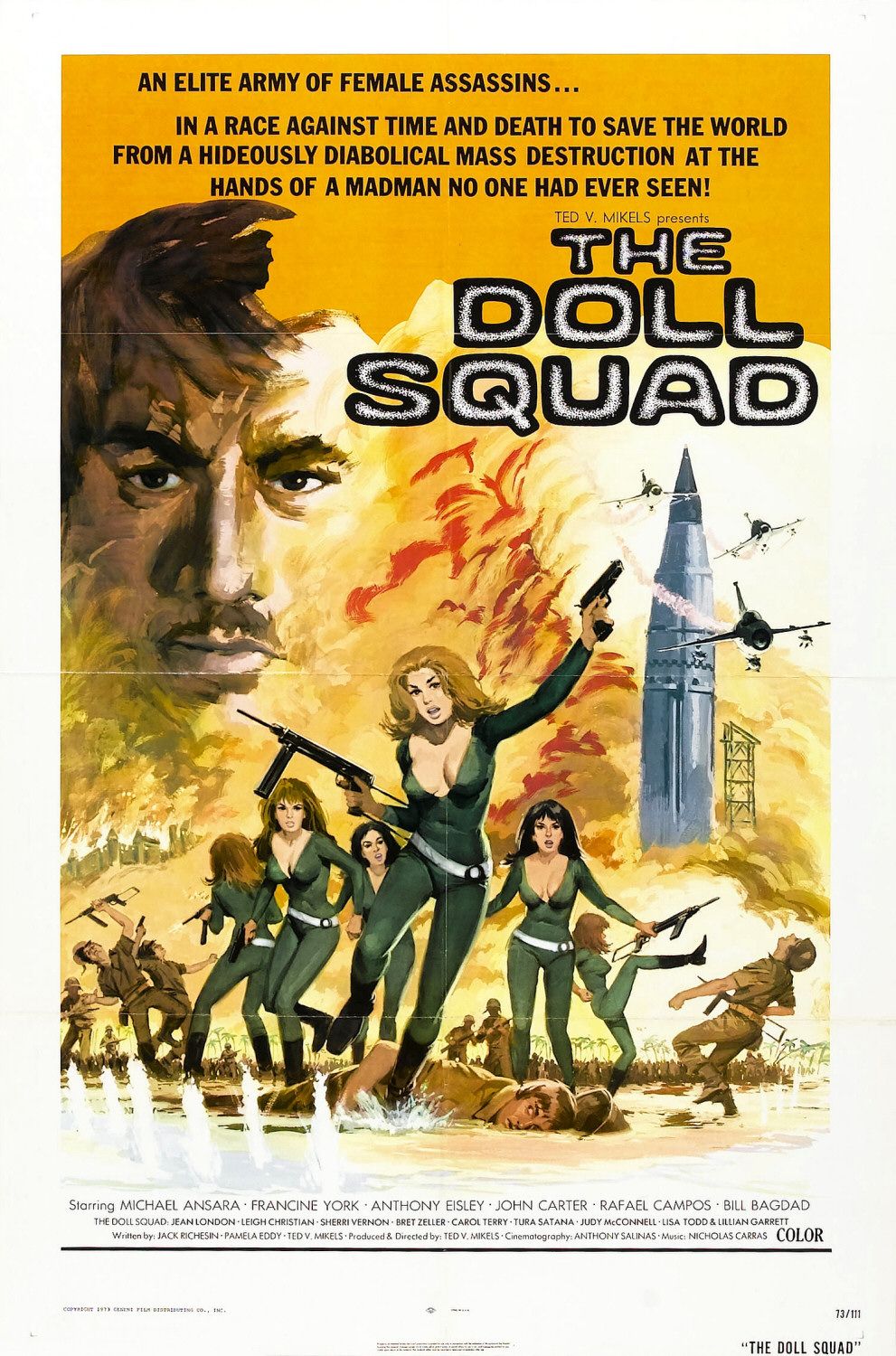 |
| Here's the brutal, unvarnished truth. The best thing about THE DOLL SQUAD (1973) is the poster pictured above. You know it. I know it. It's a great image that would have been right at home on the cover of a '70s era men's sweat magazine or paperback novel. If it had been a comic book,. Wally Wood would have been a great choice as artist. Instead, we got a film produced, directed and written by Ted V. Mikels, an auteur of low budget, exploitation films. Mr. Mikels has no one else to blame for how craptastic THE DOLL SQUAD is. And trust me, having just watched the film this afternoon (recorded off of TCM), I know whereof I speak. An unknown master criminal blows up a U.S. space probe at the start of the film (lots of stock footage used here). He sends threatening messages to a U.S. Senator and a CIA agent Anthony Eisley. They turn to the computer(!) to determine the best way to fight this menace and the computer supplies the answer: The Doll Squad. Cue psychedelic credits and the beginning of an incessant disco/spy film musical score (composed by Nicholas Carras) that literally never stops playing throughout the rest of the film. Luscious redhead Sabrina (Francine York) leads the squad which is composed of such beautiful babes as Leigh Christian and cult icon Tura Satana. They soon determine that the mastermind is one of their own, a former agent named Eamon (played by the late Michael Ansara). The squad invades his island fortress and thwarts his plan to release bubonic plague carrying rats throughout the world. The wardrobe of DOLL SQUAD consists of low cut blouses, hot pants, go-go boots, bell bottoms and bikinis. And that's just for the men (ba-dum-bum). When the squad goes into action on the island, they all change to their signature uniforms: green jumpsuits with white piping and white boots. The budget for the film (reportedly $256,000) clearly didn't allow for the use of real pyrotechnics. This is an action film in which all of the explosions (and there are several) are optically super-imposed over the action. The budget apparently didn't cover the construction of sets as all of the scenes, both interior and exterior, appear to have been shot entirely on locations and in real homes and businesses. The editing is atrocious. The print I watched may have some missing footage as there were several abrupt jump cuts. During the climactic assault on the island fortress, time and space are repeatedly fractured as we go from day to night to day and so on. The camera work, framing and overall cinematography has all of the visual panache of a driver's ed film. THE DOLL SQUAD was clearly targeted for undiscriminating audiences in rural drive-ins and urban grind houses. Mikels was far from a competent filmmaker but he sure knew how to sell the sizzle, not the steak. You bought your ticket to THE DOLL SQUAD for one reason and one reason only: to see a bunch of hot babes run around shooting bad guys and that's exactly what you get. |
Monday, December 2, 2013
WHAT I BOUGHT AT WIZARD WORLD: THE FINAL CHAPTER
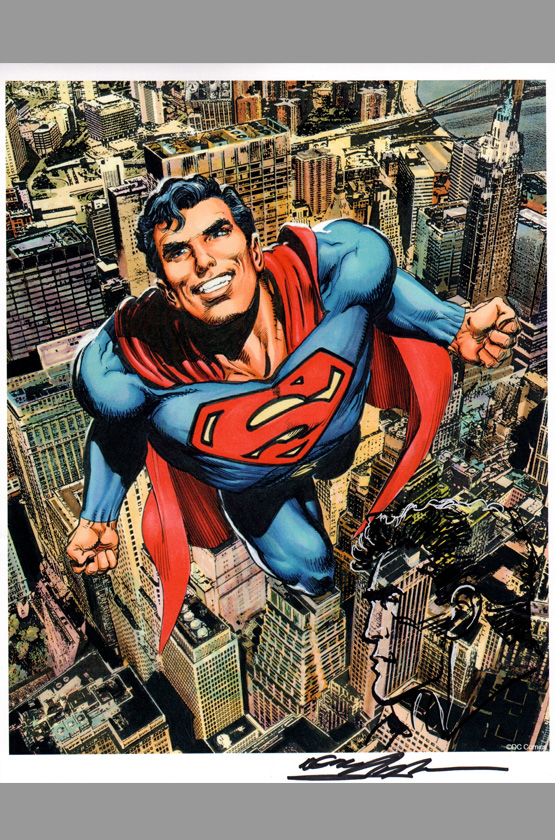 |
While I was wandering the aisles of Wizard World Austin Comic Con I stumbled across the rather large booth of legendary comic book artist Neal Adams. There he sat, visiting with fans and simultaneously sketching. Surprisingly enough, there was not a large crowd around his booth and I took some time to look it over from one end to the other. Among the items for sale were a number of prints by Adams, some recreations of classic comic book and magazine covers, while others were portraits of the super-heroes (DC and Marvel) that he has drawn over the years. The prints were selling for twenty bucks and I knew that a signed Neal Adams art print was something I absolutely had to have. The first comic book with Neal Adams artwork (both cover and interior) that I bought was BRAVE AND THE BOLD #79. I was only vaguely aware of the Deadman character (I'd seen ads for his appearances in STRANGE ADVENTURES but I'd never sampled the series) but I sure knew who Batman was and this cover really reached out and grabbed me. I loved it and made a point to start buying B&B on a regular basis, especially if the same artist (I didn't know Adams name at the time) drew it.  I kept buying B&B on a regular basis and Adams work continued to knock me out. Then came BRAVE AND BOLD #85 with a new look and character redesign of Green Arrow and a political assassination story ripped from the headlines (as the saying goes). I absolutely freaking loved this comic and to this day, B&B #85 remains in my personal top ten comic books of all time.  And I vividly recall buying X-MEN #56 off of the stands and seeing on the splash page this blurb: "And introducing the penciling wizardry of Neal Adams". At last, I had a full name to go with this incredible artist. I was more hooked than ever before. Neal Adams quickly became one of my all-time favorite comic book artists and the number of great books he drew are legion. I have many, many fond memories of buying and reading Adams illustrated books brand new off of the spinner racks and being completely spellbound and overwhelmed by the power of his art. So there I stood in front of this man whose art meant so much to me. I purchased the Superman print that adorns this blog, an image from ACTION COMICS #419. I had him sign it and inscribe it to me. I shook hands with the gentleman and then I became a twelve-year old kid. I started babbling, literally babbling, about how great his art was and how much it meant to me and how it blew my mind the first time I saw it. Adams, with great and deliberate patience (as I'm sure he's heard such rants many, many times over), simply smiled at me and said, in a conspiratorial tone, "it was my job to blow your mind." You did your job well Mr. Adams. Very well. Many thanks for the memories and for an unforgettable encounter that brought out the exuberant fanboy in me. |
Friday, November 29, 2013
WHAT I BOUGHT AT WIZARD WORLD 5
 |
| Time was running out last Friday evening for the first day of Wizard World Austin Comic Con. There was about thirty minutes to go before the doors to the convention hall were going to close for the night. My buddy Matt and I were in search of a dealer's booth that he had seen earlier in the day. He swore that this guy had a ton of trade paperbacks, hardcovers and graphic novels, all for half-price. After much searching and a few stops at some other dealers who also had half-price trades, we finally found the booth we were looking for. Remember the last shot in RAIDERS OF THE LOST ARK? This was almost like it as there were at least thirty (possibly more) long boxes full of trade paperbacks and hardcovers, all of them for sale at half the original cover price. I knew I could get into big trouble mighty quick here. I'd already spent close to the entire amount that I had budgeted for the day and I didn't want to buying stuff like a drunken sailor in a woman's prison with a fistful of pardons (if that even makes any sense). I had paid cash for everything thus far and I didn't want to go the credit card route but geez, did this guy have the goods. The very first book in the very first box in which I looked was the book you see pictured above. Regular readers of this blog know that I am a huge Doc Savage fan and this item was on my current want list. I knew I had to have this one so I pulled it out of the box and set it aside. And then I found something else I wanted, and something else, and oh, boy, does this look cool and hey, I've been looking for this one and so on and so on. I soon had a small stack of books that, even at half off cover price, were going to amount to more money than I wanted to spend. I slowly put everything back into the boxes where I'd found them and decided that there was only book that I absolutely HAD to have and providence, fate, kismet, destiny, whatever, I decreed which book that was. I bought DOC SAVAGE: SKULL ISLAND by Will Murray and walked away knowing I had done the right thing. I don't know when I'll get around to reading it but it's on my shelf alongside DOC SAVAGE: THE DESERT DEMONS (which I've read), DOC SAVAGE: HORROR IN GOLD (purchased at Midtown Comics in New York City) and DOC SAVAGE: THE FORGOTTEN REALM (a gift from my sister last Christmas). These are all brand new Doc adventures written by pulp expert Will Murray. The books are based on notes, outlines and other materials left by the late Lester Dent, the creator and chief writer of the original Doc Savage series of pulp novels. As I said, I've yet to read SKULL ISLAND and other than the fact that it involves Doc and King Kong, I have no idea how the actual story within plays out. I tell you that because in 1979, my buddy Bob Parker and I, had a similar idea. We were going to write our own original Doc Savage novel (I guess you'd call it fanfic nowadays) which would explain where Doc was when Kong was on his rampage in New York and why Doc wasn't involved in such an obvious 1930s New York City set adventure. We decided to approach the story by declaring that everything that happened in the film, KING KONG (1933) and the early Doc Savage novels, was canonical and really happened exactly as depicted on screen and page. Our job was to fill in the blanks, answer some obvious questions and create an "untold" story of Doc's earliest days as an adventurer and crime fighter. We decided that all of the equipment that Carl Denham used on his expedition to Skull Island had been purchased from a young Clark Savage Jr. who held the patent on the gas grenades and other gear used in the film. Doc didn't make the voyage to Skull Island because he was involved with two equally pressing matters in New York City: his first major super villain and his first (and to date, only) love interest. That's right, Doc was going to be in love for the one and only time in his career in our tale. We pictured a young Clark operating entirely on his own without the aid of the Fabulous Five. He had his headquarters on the 86th floor of the Empire State Building and flush with cash from his sale to the Denham expedition, was busy developing new technology to use in his war on crime. His on-going battle with his first super foe (a villain who had stolen some of Doc's devices) intersected with Clark's love affair with a beautiful young woman. Everything would come to a smashing climax on the night King Kong was on the loose in New York City. While Kong climbed the Empire State building, Doc and his foe were engaged in a literal fight to the death within Doc's headquarters on the 86th floor. In the process, Doc's love was murdered by the villain and Doc was forced to take the bad guy's life (again, for the first and only time in his career). Devastated by the loss of his one true love, the blood on his hands from the killing of his foe and from his inability to stop the giant ape from wreaking havoc, Doc would shutter his headquarters and retire to his Fortress of Solitude. There he would re-dedicate himself to his campaign against crime, swearing to never again take a human life and to never allow himself to fall in love again. He would also realize that as supremely skilled as he was, Doc couldn't take on his lifelong crusade single handedly. He'd tried that once and failed. And so, he would decide to enlist the aide of his five best friends from the Great War and make them his team-mates in his adventures. Bob and I were jazzed with what we had come up with. Remember, this was in 1979 and we were both young enough and foolish enough to believe that we could actually write such a book. Our working title was "Apocalypse Night" and we started writing it in a unique way. We decided to alternate chapters, Bob would write one, I'd write the next and so on with the goal of ending each chapter on a cliffhanger that would have to be resolved by whoever wrote the next chapter and that writer would then advance the narrative and end his chapter on another cliffhanger. That was the plan. The execution was something entirely different. If I recall correctly we wrote a total of two chapters. Bob wrote the first one, I wrote the second (in which I had Ann Darrow working in one of Pat Savage's beauty salons) and that was it. We never wrote another word, collectively or individually. I'm anxious to see what approach Will Murray takes with his story of Doc and Kong. I'm sure it'll be a good one and I know I'll enjoy reading it. But I can't help but wonder if it will in any way remotely resemble what Bob and I dreamed of doing thirty four years ago. |
Thursday, November 28, 2013
Tuesday, November 26, 2013
WHAT I BOUGHT AT WIZARD WORLD 4
 |
| I scored a still shrink wrapped, hardcover copy of MARVEL MASTERWORKS: SGT. FURY VOLUME 3 for half-price at Wizard World Austin Comic Con last week. This handsome volume (love the military camouflage graphic) reprints SGT. FURY AND HIS HOWLING COMMANDOS #24-32 and ANNUAL #2. The stories herein were written by Stan Lee and Roy Thomas (my all-time favorite comic book writer) and illustrated by Dick Ayers. I wasn't buying SGT. FURY on a regular basis when these comics were originally published in 1965 and 1966 (that habit started in September, 1966, when I started buying every issue of every Marvel comic I could find). These issues mark a turning point in the series as Stan Lee turned the scripting reins over to young Roy Thomas (who, in his introduction to the book, confesses that SGT. FURY was one of the few Marvel comics he did not read). One of the key issues for me in this collection are #27 (Feb. 1966) featuring "Fury Fights Alone" in which the secret origin of Fury's later, post-war permanent eye-patch is revealed. I never bought this comic when I was a kid but I recall seeing it advertised in almost every Marvel comic that was published that month. The other standout issue for me is #29 (April, 1996) with the story "Armageddon!" I remember reading this comic one afternoon at summer camp and wondering how in the world to pronounce this new, unknown word: Armageddon. I sounded it out as "Ar-Mage-Don" but somehow, I knew that wasn't correct cause I'd never heard anyone say such a word. I finally figured it out later and added a new, somewhat sophisticated word to my ten-year-old kid vocabulary. Who says comics aren't educational? |
Monday, November 25, 2013
WHAT I BOUGHT AT WIZARD WORLD 3
 |
| Once upon a time, major motion pictures had souvenir program books produced for sale at select first run movie theaters across the country. You'd buy your ticket to the show, your popcorn and Dr. Pepper (that's what I always get) and if you were lucky enough, a souvenir program book. These booklets were sometimes hardbound, sometimes soft cover and they were full of color stills from the film you were about to see along with information about the cast and crew and the production of the film. My collection of these souvenir movie program books includes EXODUS, AROUND THE WORLD IN 80 DAYS, BEN-HUR, SPARTACUS, DOCTOR ZHIVAGO and LAWRENCE OF ARABIA. I used to have more, including 2001: A SPACE ODYSSEY, THE GODFATHER, STAR WARS, ALIEN and CLOSE ENCOUNTERS OF THE THIRD KIND. When I found the program booklet for SUPERMAN: THE MOVIE at Wizard World Austin Comic Con on Friday, I knew it was an item that I had to have. It's a neat little collectible from one of my all-time favorite films. The one I bought was in pretty rough shape and the dealer wanted five bucks for it. He was also selling the James Bond mag I wrote about in my previous post so, taking a page from the AMERICAN PICKERS handbook, I bundled the items and asked him what was the best he could do for the two books considering the lower grade condition of both. He let me have them for twenty-five bucks, which means I got this movie program for free. Sweet! |
Sunday, November 24, 2013
WHAT I BOUGHT AT WIZARD WORLD 2
 |
| Dell published thousands of paperback books, comic books and magazines over the years the company was in business. At the height of the mid-'60s James Bond craze (circa 1965), the company published the magazine pictured above. It contains articles and photographs from the first three Bond films: DR. NO, FROM RUSSIA WITH LOVE and GOLDFINGER. The mag is a much sought after item and is highly prized by 007 collectors. I found a copy at Wizard World Austin Comic Con this past Friday. The condition wasn't the greatest. There's a light stain on the front cover but the mag is completely intact and readable with no loose or missing pages. A better condition copy would have cost 3 to 4 times as much as this one which I gladly paid twenty-five dollars for. A great find! |
Saturday, November 23, 2013
WHAT I BOUGHT AT WIZARD WORLD 1
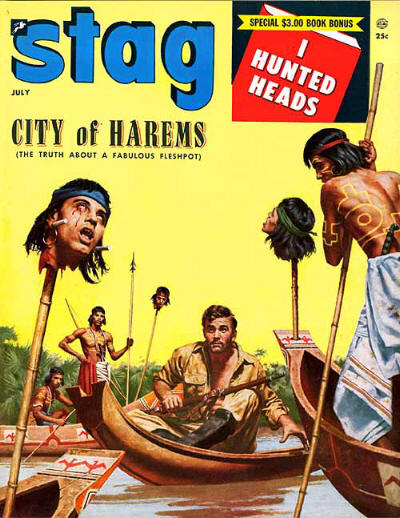 |
| Here is the first of the several treasures I bought at Wizard World Austin Comic Con yesterday. Pictured above is STAG Magazine for July, 1955. Regular readers of this blog know of my affection for vintage men's adventure magazines or "men's sweat mags" as they have sometimes been accurately called. I asked around at several dealer's booths yesterday in my quest to find some affordable men's adventure mags. I was directed to one dealer, Black Cat Comics, but alas, I don't recall the name of the gentleman I dealt with. He was a nice guy though and he gave me a fair price on the mag. He had only one men's adventure mag for sale and it's pictured above. I bought it immediately. He told me that a few years ago he bought a pretty sizable collection (80 some odd issues) of vintage sweats, kept a few of the very best issues (the ones with Nazi bondage covers) and sold the rest on eBay. Granted, I didn't canvas every single dealer at the con in search of men's adventure mags but I think the fact that only one of the dozen or so dealers I did check out had any of these for sale and only one issue to boot proves my theory that these babies are becoming harder and harder to find and if you're a collector of this material, you've got to buy them when and where you find them. This one's a beauty with a great head hunter cover. I've already filed it away with my other sweats and in doing so, discovered that I have more issues of STAG (ranging from the early 1950s to the early 1970s in cover dates) than any other men's adventure magazine title. More to come. Stay tuned. |
Friday, November 22, 2013
MY FAMOUS MONSTERS 50
| Lon Chaney Jr, as Larry Talbot, the Wolfman, adorns the cover of FAMOUS MONSTERS #99. This issue features a 16 page film book of the Universal "monster rally" horror classic HOUSE OF FRANKENSTEIN. Great! |
Wednesday, November 20, 2013
MY FAMOUS MONSTERS 49
 |
| A nice portrait of one of the titular characters from INVASION OF THE SAUCER MEN graces the cover of FAMOUS MONSTERS #98. Other features include BLOOD FROM THE MUMMY'S TOMB (Hammer horror), When Dracula Met The Vampires. THE THING WITH TWO HEADS (a horrible film) and DR. PHIBES WRITHES AGAIN (I love Dr. Phibes!) |
Monday, November 18, 2013
MY FAMOUS MONSTERS 48
| There must have been a budget crisis at Warren Publications in the early 1970s. How else to explain yet another issue of FAMOUS MONSTERS, this one #97, with artwork from a then current horror film? This approach must have been cheaper than commissioning original artwork and I can understand and respect that costs had to be cut in order for the company to stay in business. But I really don't care for some of these FM covers circa 1972/1973. Didn't stop me from buying 'em at the time though. When I was in high school, I bought every Warren mag I could get my hands on! |
Sunday, November 17, 2013
THE LAND LEVIATHAN
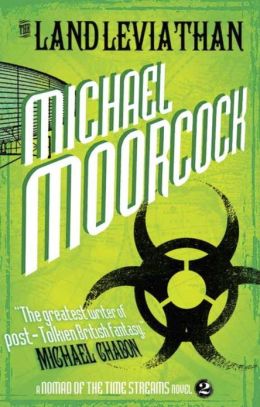 |
| I finished reading THE LAND LEVIATHAN by British science-fiction author Michael Moorcock the other day. It's the second book in his Nomad of the Time Streams trilogy. I recently posted about the first book in this series, THE WARLORD OF THE AIR. I have a copy of the third and final book, THE STEEL TSAR, on my shelf waiting to be read. LAND continues the story of one Oswald Bastable, a British soldier from the turn of the 20th century who has somehow become adrift in time. This drifting causes him to visit various alternate timelines in which history happened differently than it did in ours. In LAND, Bastable finds himself in a world in which, due to some advances in technology in the late 19th century, World War I occurred several years earlier than in our timeline and with drastically different results. The major European powers as well as the United Stares, have been devastated by the war with Great Britain a no-man's land due to the use of plague weapons in the war. The three remaining world powers include the Australasian-Japanese Federation, Bantustan (formerly South Africa, now a peaceful, neutral nation ruled by President Mahatma Ghandi) and the Ashanti Empire, an alliance of African nations ruled by Cicero Hood. As in the previous novel, Moorcock uses this strange new world to explore ideas about geo-politics, systems of government, race relations, philosophies and more. Bastable wanders this timeline for a while before settling in Bantustan in the service of President Ghandi. But it's not long until he's asked to be a representative to the Ashanti Empire, where he learns more about the warlord Cicero Hood who has built the most technologically advanced army in the world, a military force comprised of ships that fly in the air, upon the water and below the waves, along with immense tank-like ironclad vehicles. Hood plans to invade the United States and liberate the black men and women who have been forced into a new iteration of slavery. There's a tremendous air/sea battle in the North Atlantic, an attack on New York City and a climactic showdown in Washington D.C. in which the monstrous Land Leviathan is used to conquer the white slavers. The book ends with Bastable's where-abouts unknown but that question is sure to be answered in the third and final novel. THE LAND LEVIATHAN is a relatively short novel and it reads very quickly. I wish Moorcock had lavished a few more pages on details on some of the battle sequences (they seem to be over much too quickly). Also, the first fifty pages are all prologue in which Moorcock's grandfather goes searching for Bastable in China only to find the mysterious Una Persson (another time traveler who also appeared in THE WARLORD OF THE AIR) and the manuscript of Bastable's adventures. Still, I enjoyed reading THE LAND LEVIATHAN and will get around to STEEL TSAR after I read something else for a change of pace. |
Friday, November 15, 2013
MY FAMOUS MONSTERS 47
| Two recycled images are used on the cover of FAMOUS MONSTERS #96, a "Special Wolfman Issue". What's wrong with this picture? The blue-skinned beast on the left is Mr. Hyde, not a wolfman or a werewolf! |
Thursday, November 14, 2013
MY FAMOUS MONSTERS 46
 |
| The cover art for FAMOUS MONSTERS #95 is totally uninspired and completely generic. It's not a bad piece of art it just doesn't belong on the cover of an issue of FAMOUS MONSTERS. It's better suited to an issue of CREEPY or EERIE. Features include Guess What Happened to Count Dracula, DR. PHIBES, the new PLANET OF THE APES film and BLACULA. Photos or art from any one of the latter three films would have made a much better cover. |
Monday, November 11, 2013
MY FAMOUS MONSTERS 45
 |
| A great portrait of the Frankenstein monster by Sanjulian graces the cover of FAMOUS MONSTERS #94 (from November 1972). Forry puts the entire table of contents on the cover of this one and the line-up of features and articles is a good one. |
Friday, November 8, 2013
"CAN I HAVE MY SHOE BACK?"
 |
| I'm just back from seeing THOR: THE DARK WORLD (in 3-D!) and I loved every minute of it. As stated in my last post, I started reading THOR comics in 1964 on a hit-and-miss basis. I liked the character a lot and in September 1966, I began buying THOR every month (along with every other Marvel comic then published). I liked Thor's adventures on Earth well enough, especially when he duked it out with The Absorbing Man but it was always the scenes set in Asgard that really blew me away. Over the years I came to feel that Thor, as a character, worked better in Asgard (and other cosmic locales) than on Earth. Asgard, as drawn at the time by Jack Kirby and Vince Colletta, was a fantastic realm of the imagination where Thor and his supporting cast worked best and where The King could cut loose with his incredible artwork. That's a big reason why I enjoyed THOR: THE DARK WORLD so much. Three-quarters of the film takes place either in Asgard or the titular Dark World. The climax takes place both on Earth and throughout the Nine Realms. We see more of Asgard than in the previous THOR film and it's all good. The eight-year-old kid in me was practically giddy with joy at seeing the work of Jack Kirby and Walt Simonson brought to life on the big screen. The action is fast and furious, the special effects breathtaking and the comic relief is doled out in just the right amount. Two Asgardians die (one gets better), the fate of another Asgardian is a mystery at the end of the film and two Asgardians figure prominently in the now standard after credits teaser sequence. About that sequence: By Odin's Beard! I never thought I'd see the day when Marvel villain *** ********* would appear on a movie screen. Fantastic! And the plot thickens regarding some certain gems. Natalie Portman is lovely as Jane Foster and she shares a lot of screen time with Chris Hemsworth's thunder god but I wish Sif (Jaimie Alexander) had a bigger part. I know the producers are playing up the god/human love affair between Thor and Jane Foster but I always preferred Sif as Thor's true love and would love to see the two come together eventually. On top of all of the Asgardian goodness to behold, there was a terrific trailer for CAPTAIN AMERICA: THE WINTER SOLDIER. I cannot wait for April 4th! Face it True Believers, this is the Marvel Age of Movies! 'Nuff Said! |
MY FIRST THOR (AND A FEW OTHER MARVEL COMICS)
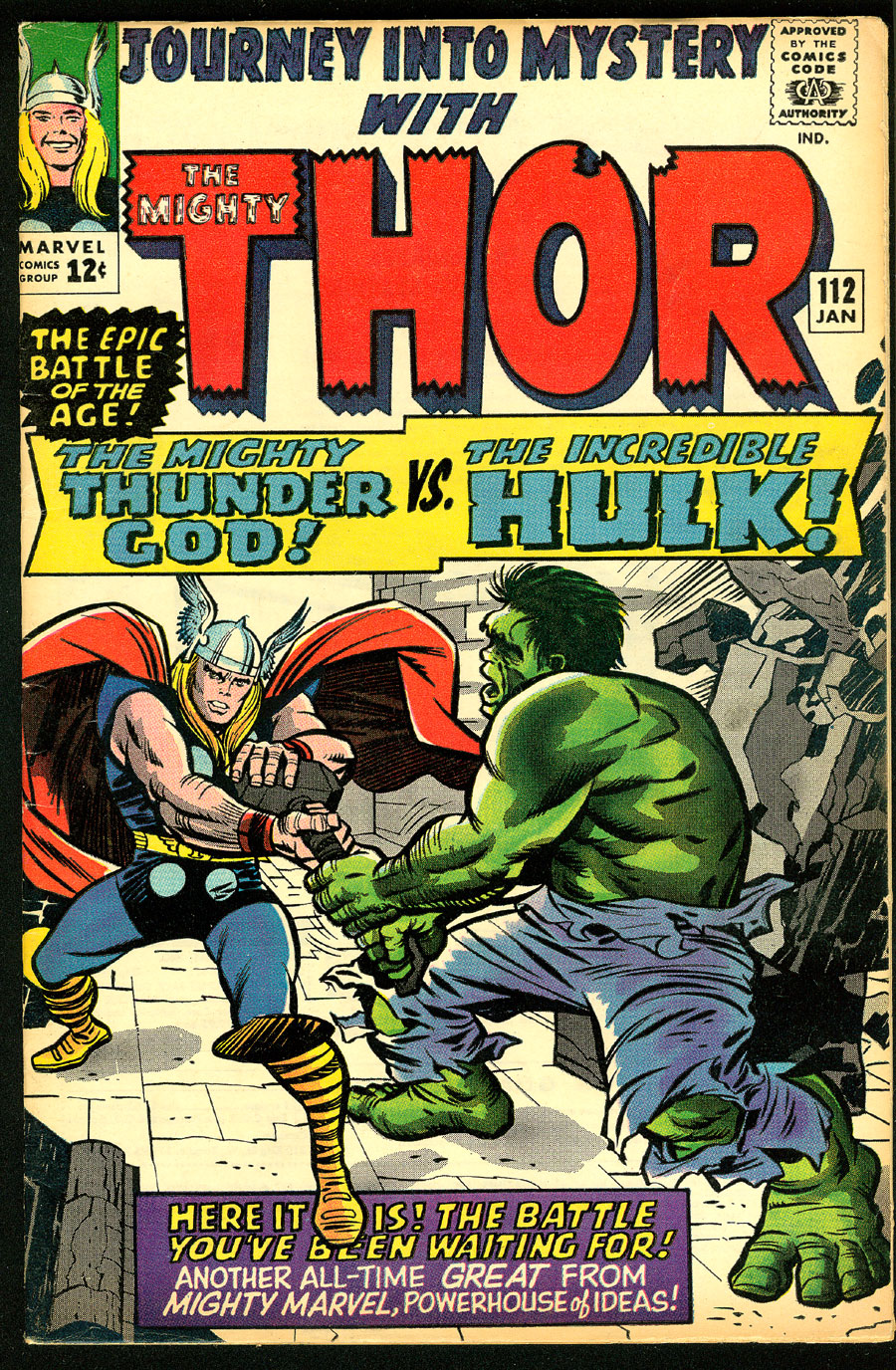 |
| I'm looking forward to seeing THOR: THE DARK WORLD later today and my anticipation of the second Thunder God film has me thinking about the first time I ever encountered the character. It was November 1964. On Friday afternoons after school my mother would take me with her to do her weekly grocery shopping. The store she went to is now a Randall's in the Casis Village Shopping Center but back in the 1960s, it was, if memory serves me right, a Rylander's grocery store. The store was smaller back then and many years ago the space was expanded to the footprint it now occupies. In order to add more square footage, the neighboring space was taken over. That space was home to a drug store which I cannot remember the exact name of. While my mother shopped, I would go next door and look at (and buy) comic books. The drug store had a magazine stand at the front of the store but back in the back, tucked into the left rear corner of the store and next to the honest-to-goodness horseshoe shaped soda fountain (which served food and beverages) were not one but two wire spinner racks full of comic books. I couldn't buy everything I saw even though I wanted to. After all, I was only eight-years-old and I usually didn't have more than a quarter to spend (which in those days would cover either two twelve cent comics or one twenty-five cent giant-size beauty). I bought a wide variety of comics but the books published by Marvel were starting to catch my eye. There was something about the artwork, the characters, the lettering, the cover copy, even the coloring, that set these books apart and made them appear far more dramatic and exciting than anything else on those spinner racks. JOURNEY INTO MYSTERY #112 really appealed to me. I had no idea who Thor or the Hulk were. I only knew that here were two super-heroes (one of them a kinda Frankenstein looking guy) fighting. I decided to take a chance and buy it. Boy was I glad I did. I loved it! In addition to being exposed to both Thor and the Hulk, I was exposed to the history of the early Marvel Universe (the story in JIM #112 took place "off camera" during AVENGERS #3). I was also treated to the storytelling magic of Stan Lee, Jack Kirby and Chic Stone. It was love at first sight. November 1964 was a momentous month for me in terms of comic book purchases. The other Marvel books I bought that month include: 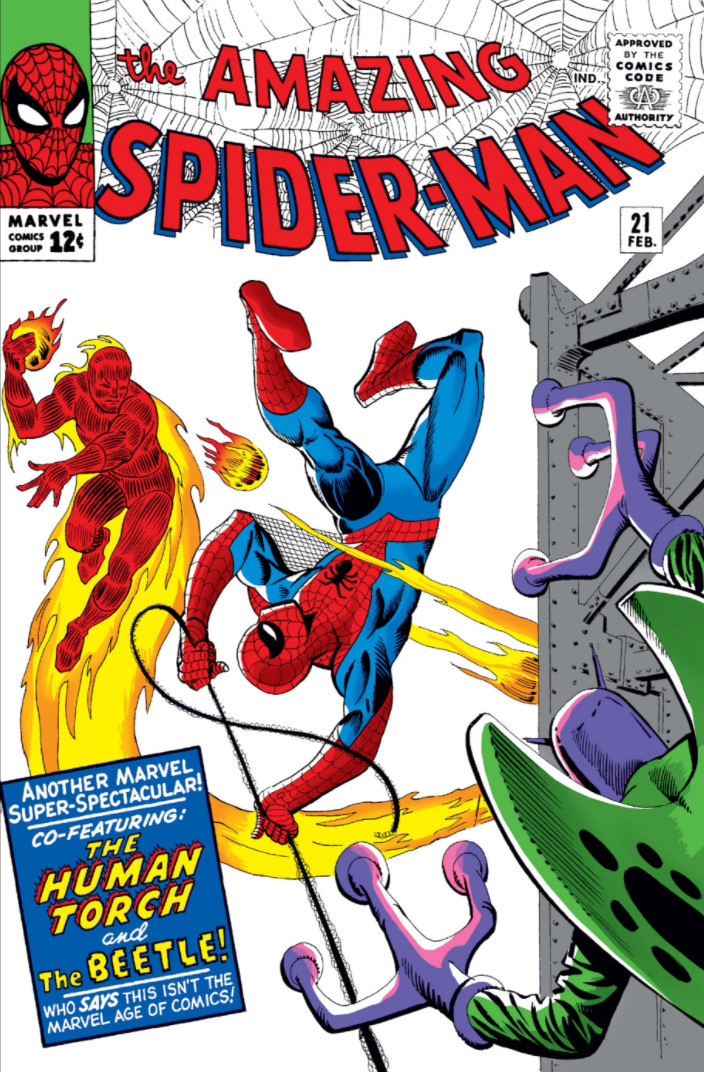 AMAZING SPIDER-MAN #21 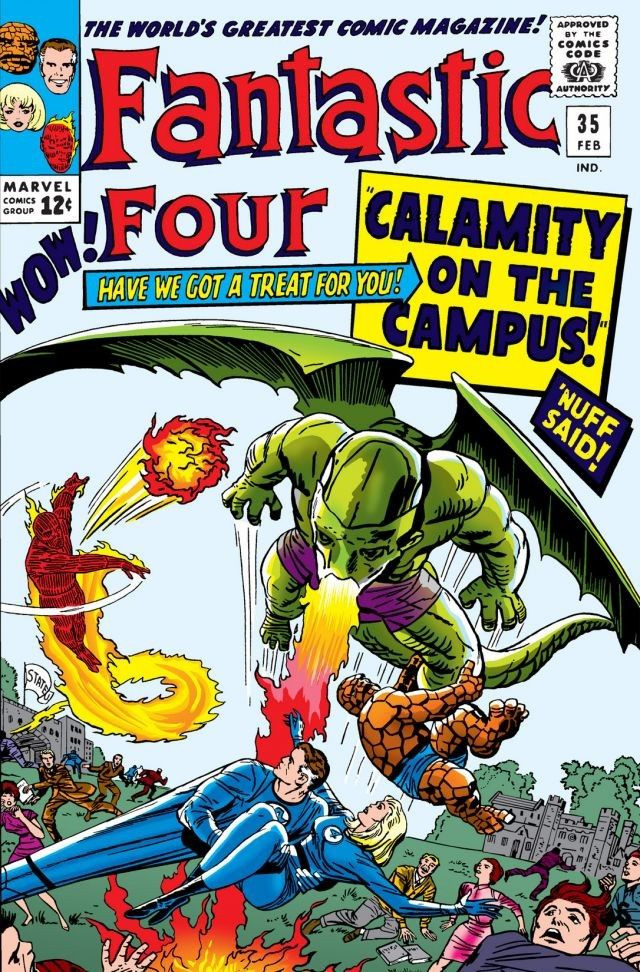 FANTASTIC FOUR #35  TALES OF SUSPENSE #62 My Marvel buying habits continued from that point on but on a very sporadic basis. I didn't buy every issue of every title but I almost always bought one or two Marvels every time I visited that drugstore. In September 1966 I took the plunge and decided to buy every issue of every Marvel comic every month from then on. I'll never forget discovering those mind-blowing mid-60s Marvel comics on those spinner racks at the back of that long gone drugstore. Pure magic! |
Thursday, November 7, 2013
MY FAMOUS MONSTERS 44
 |
| Another image from an outside source graces the cover of FAMOUS MONSTERS #93 (October 1972). The skull with one eyeball image is from the one-sheet poster for the British anthology horror film TALES FROM THE CRYPT, which adapted stories from the classic E.C. horror comics of the 1950s. However, this issue is a "Fearbook" (Forry speak for yearbook) which means it's an all-reprint collection of the best material from past issues. Featured here are werewolves, robots, KING KONG, Man-Eating Plants, THE PIT AND THE PENDULUM and more. |
Wednesday, November 6, 2013
MY FAMOUS MONSTERS 43
 |
| FAMOUS MONSTERS #92, from September 1972, is devoted to the life and films of Bela Lugosi, one of my all-time favorite horror film stars. A great issue! |
Monday, November 4, 2013
WEB OF THE CITY
 |
I finished reading WEB OF THE CITY by Harlan Ellison the other day. It was my second-time around for the novel, which was Ellison's first. The first time I read it, back in the 1970s, the book looked like this: As you can see, the cover art for both editions couldn't be more radically different if they tried. While I admire all of the covers by the Dillons that adorned the Pyramid Books series of mid-'70s Ellison paperbacks, I have to admit that I prefer the 2013 version courtesy of artist Glen Orbik. Hard Case Crime does a great job of producing books that have a distinct retro look and vibe and WEB OF THE CITY, first published in 1958, fits the bill perfectly. WEB is the story of one Rusty Santoro, a Brooklyn high-school student by day and a gang leader by night (and other times off). As the story begins, Rusty has decided to call it quits with the Cougars, the street gang he has been presiding over. But you don't just quit the Cougars and Rusty has to prove himself in a vicious knife fight with Candle, the young thug who replaced him as leader of the Cougars. Rusty is victorious and begins to believe that maybe he really can quit gang life, finish school and pursue a career. But when his younger sister Dolores is raped and murdered, Rusty finds himself back on the mean streets and tracking her killer with a fiercely determined single-mindedness. Rusty's search takes a few twists and turns before ending with a rooftop battle to the death with the killer. Even though Rusty survives, his life is just as bleak and doomed to a dead-end as ever before. WEB OF THE CITY is far from Ellison's best work. That would come later. But it does demonstrate that as a young writer Ellison had stories to tell and a unique voice to tell them with. WEB paints a vivid picture of gang life in 1950s New York City and even though slightly pulpy at times, the portrait rings true and accurate with Rusty a sympathetic, if doomed, protagonist. The remainder of the book contains three short-stories by Ellison. The first, NO WAY OUT, first published in GUILTY DETECTIVE STORY MAGAZINE in September, 1957, is essentially one long chapter of WEB OF THE CITY with a different ending. The next, NO GAME FOR CHILDREN (from ROGUE, May 1959) is a cat-and-mouse game between a young punk and his older, intellectual neighbor with a neat twist ending straight out of an E.C. crime comic. The final short story, STAND STILL AND DIE! (GUILTY DETECTIVE STORY MAGAZINE, September 1956) is a fast-paced, uber pulpy yarn about a hard-boiled cab driver who fights crime with his fists and his smart-aleck mouth. Look for a longer post coming soon about Harlan Ellison and the effect his work has had on my life. For now, check out WEB OF THE CITY to see how his illustrious career got started. You won't regret it. |
Subscribe to:
Comments (Atom)

